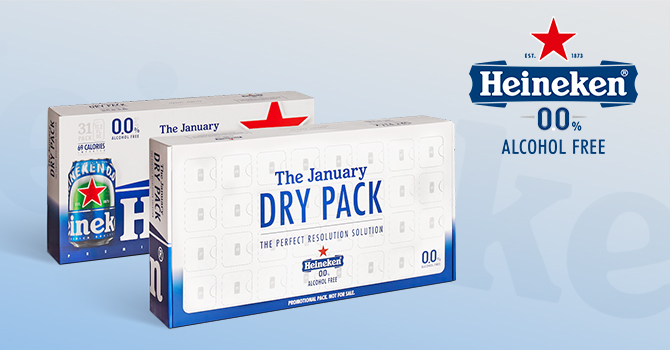
Heineken USA (HUSA) is giving away 1,000 31-packs of its non-alcoholic beer, Heineken 0.0, as part of a campaign to win beer-drinking occasions during “Dry January.”
Dry January is a month of no consumption of alcohol, which one in five Americans told YouGov they would be observing to start 2020.
In an effort to capture those presumably lost drinking occasions, HUSA launched a promotion today (December 27) to give away its “January Dry Pack” — which includes 31 cans of Heineken 0.0. The packs won’t be available at retailers.
Heineken USA VP of marketing Borja Manso-Salinas told Brewbound that the program’s goal is drive awareness and trial of Heineken 0.0, which launched in the U.S. in 2019.
“We hope at least 1,000 people will taste it and hopefully they may share some of it as well,” he said. “Quite frankly, that’s the best marketing for us because it tastes great.”
In an effort to boost the non-alcoholic beer brand again in 2020, HUSA has committed another $50 million to the brand and plans to give away 10 million samples throughout the year.
“It’s really our silver bullet,” he said. “We have a liquid that is amazing, and it’s not easy to do.”
Manso added that the journey for Heineken 0.0 has just begun, as the company attempts to transform the non-alc beer category and educate consumers. Dry January is the first of several “tent pole moments” for the brand in 2020, including “Bring Your Beer to Work Day” on April 26, summer samplings, and the holiday season.
Through December 1, HUSA was the fifth largest beer company in the U.S., with off-premise dollar sales of $1.3 billion (down 2.4% year-over-year), according to market research firm IRI.
The Heineken beer brand’s off-premise dollar sales were roughly flat through the end of November, up 0.6%, to more than $704 million. However, the brand’s volume was down nearly 1% year-to-date.
Meanwhile, Heineken 0.0 was HUSA’s biggest growth brand in 2019, selling more than 1 million cases and giving HUSA 11% share of the non-alc beer market.
“We have sold over 50% more than what we expected, which is a big success,” he said. “But this is still relatively small compared to the potential of the category and these products. So we are cautiously satisfied with how the first year has gone, but we know this is still only the very beginning.”
Indeed, although year-to-date non-alc beer dollar sales in off-premise are up more than 22%, to more than $121 million, in multi-outlet and convenience stores tracked by IRI, the segment remains among the smallest, with non-alc beer volumes half of those of cider, despite volume growth of 12.7% through December 1.
For 2020, Manso said the company’s forecasts for Heineken 0.0 are “very ambitious,” although he declined to provide specific numbers.
“We’re not thinking about incremental growth,” he said. “It’s substantial.”
The company’s goal is to accelerate Heineken 0.0’s growth over the next three years, which Manso called a “transformational” opportunity for HUSA.
Manso said he sees potential for Heineken 0.0 to win back lapsed beer drinkers who have left the category as they’ve moderated their consumption and bring them back into beer-drinking occasions.
According to Manso, 12% of Heineken 0.0’s volume was sourced from outside of the beer category. Another 50% of the brand’s volume came from beer drinkers who mixed the non-alc brand into their drinking occasions. The rest of the volume is being sourced from domestic beer brands.
